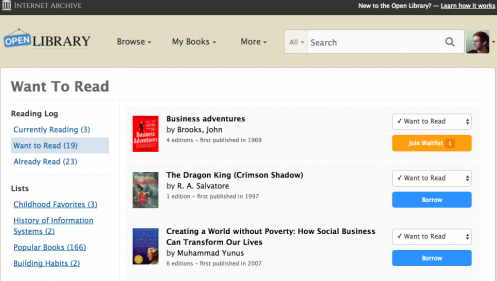Hi book lovers,
Starting 2020-05-26, Reading Logs for new Open Library accounts will be public by default. Readers may go here to view or manage their Reading Log privacy preferences. This will not affect the privacy of your reading history — only books which you explicitly mark as Want to Read, Currently Reading, or Already Read on Open Library. The Reading Logs of patrons who signed up for Open Library accounts prior to this date will remain private until they choose to update their settings here. New users may also set their Reading Logs to private using this same link.
Open Library has consistently valued two principles: openness and reader privacy. As an open source, public library, we feel strongly about creating a warm, welcoming ecosystem which promotes sharing, diversity, and openness. We’re stronger, together, when we work as a community. At the same time, Open Library is dedicated to providing a secure, safe, and judgement-free service for those who rely on reader privacy. We take our responsibility as a library strongly to safeguard what books you’re reading and borrowing, unless you decide to share this information.
Since 2010, OpenLibrary.org has offered public reading lists to help patrons organize and share books they love. Since then, readers have published more than 130,000 public lists.
Over the last 10 years since we introduced lists, we noticed thousands of readers creating bespoke lists called “want to read” or “already read” or “favorite books“. We also noticed many popular reading services offer special personal lists which help patrons keep track of the books they are reading.
In response, at the end of 2017, Open Library launched a new Reading Log feature; a special type of list which lets readers keep track of books they Want to Read, books they’re Currently Reading, and books they’ve Already Read.
Since introducing the Reading Log, 943K unique readers have added books to their Reading Log 1.8M times.
When we first launched this feature, we didn’t know how the community would use it and so to be conservative, we made the Reading Log private by default. One point of feedback we consistently get from our patrons is, they wish it were easier to share their Reading Log with their friends. Lists on Open Library are already public. So are favorites on Archive.org. At the same time, it’s important for us to keep our promise to readers. We know some patrons may prefer setting their Reading Logs to be private, and we respect this.
Based on this feedback, and in the service of living up to the name “Open Library”, starting 2020-05-26, Reading Logs for new Open Library accounts will be public by default. Readers who create new accounts may go here to view or manage their Reading Log privacy preferences. Again, if you are an existing Open Library patron, your Reading Log will remain private unless you have already, or until you explicitly, update your settings here.
We hope many in the community will join us in making Open Library a more open ecosystem where book lovers can discover and share titles. While some platforms only offer a public Reading Log, Open Library is committed to continue offering a private setting for our patrons. As an organization which wears the motto, “Universal Access to All Knowledge” on its sleeves, we decided transitioning to public-by-default for new accounts better aligns with the spirit of working together to craft the World’s library together, and ultimately is a better outcome towards serving our broader community.
Open Library is constantly evolving and we exist to serve our patrons and our community. If you have strong opinions, we want to hear from you. Please send an email to mek@archive.org. Please try to be kind, we’re doing the best we can to make the right decisions with feedback from more than 3,000,000 readers like you. If you’d like to get involved and help, check our volunteer page or explore Open Library on github.
P.S. We’ve heard feedback that readers would like to be able to add notes to their reading log books, keep track of their place, and check-in the pages they’ve read, and we hope we’ll be able to address some of these wishes in a later post.
Sincerely,
The Open Library Team

